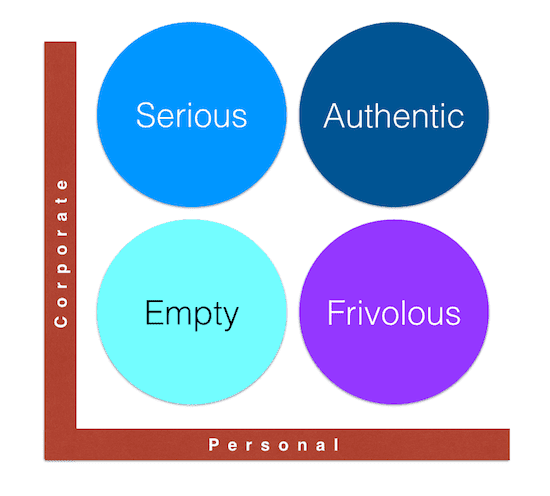Mitch Joel, the inspiring content provider and a role model for me personally, recently recorded yet another stirring podcast, entitled “Laughing all the way to the Bank with James Altucher.” In this podcast, Mitch and James discuss their shared passion for standup comedy and the relevance of stand-up comedy skills in business. The particular angle they explore relates to the delivery of a message/speech. Great standup comedians use timing, inflection, expression and gestures with great artistry. {Tweet this!} So, the bottom line, for those who are in the business of speaking and/or need to present regularly, is to learn from the best comedians. Mitch and James refer to some standout comedians and show, including Jerry Seinfeld, Comedians in Cars Getting Coffee, WTF with Marc Maron).
To what extent does personality have a place at work?
Mitch’s podcast led me to consider a another question: what place does personality and sense of humor have at work? I have long-held that branding must get personal. After all, what good is a brand that is bereft of personality? Ideally, your brand is providing a personalized and, even, personal service to your customers. Granted, how personal that service is depends on the sector. Customers are looking for a complete, efficient and engaging experience when they consume your offer. The added value lies squarely in the personal relationship between the customer and the brand. {Tweet this} But, if branding is to get more personal, it then stands to reason that an employee’s personality should be brought to work. But, just how much personality to bring? For example, sense of humor — as a part of your personality — can often verge into areas that include deprecation, one or other form of -ism and, heaven forbid, politics and religion.

Can you be a comic at work?
When one considers sense of humor at work, especially if you are in Human Resources and/or the Legal department, there is a natural tendency to veer away, much like raising topics such as politics, religion and sex. These are taboo subject matters. Yet, it is good to laugh. If kids can laugh on average 200-300 times per day, an adult manages to eke out a laugh around 3-5 times (depending on the culture, too). Laughter is a release. It is bonding. It is energizing.
Perhaps surprisingly, cultures don’t all view laughter in the same way.Some cultures, such as Azerbaijan, explicitly frown on any form of levity at work.
“Smiling beyond a moderate smile could also have a negative effect, since when a smile expands to look like laughter, it has quite a different meaning. Azeris laugh only if there is a real reason to laugh, smiling too widely for no apparent reason could create a “gap”… [Source: intercultures.ca]
As we may recall, the Turkish Deputy PM, Bulent Arinc, in July 2014, said that he believed women should be forbidden from laughing [BBC report]. This just shows how evocative, if not provocative, laughter may be in society, much less at work. The Japanese are famous for covering their mouths when they smile. So, being a comic at work and exposing your sense of humor can be tricky.
Personality without sense of humor?
So, the first question is to what extent one can/should promote personality at work? Secondly, how does one bring a full and authentic personality without a sense of humor? As I see it, there are three keys to enabling an environment where individual personality — and even one’s sense of humor — can flourish at work:
- the corporate culture and values have the amplitude to accept diversity and, inevitably, a degree of error
- individuals are hired and fired according to these values
- the boss sets (and models) the tone
Don’t leave your personality at home
As much as industries such as banking, pharmaceuticals and aerospace demand extreme rigueur, even in such serious sectors, there is a need for drive, camaraderie and inspiration. In each of these characteristics, an individual must delve into the personal space. Values are, by definition, tapping into the personal. The challenge is to marry strength of personality with the ambition and mission of the company. The values and associated behaviors are what give substance to a corporate culture. In accepting to have employees display their personality, limits are obviously needed. All the while being professional, we can inject personality, but must stop short of “too much.” The coherence and congruence of the mix of personalities with the corporate culture is fatally important. The much vaunted concept of authenticity can be reached when individual personalities feel motivated and comfortable within the fixed bounds. {Tweet this}
What do you think? Would love to have your reactions!











Trackbacks/Pingbacks